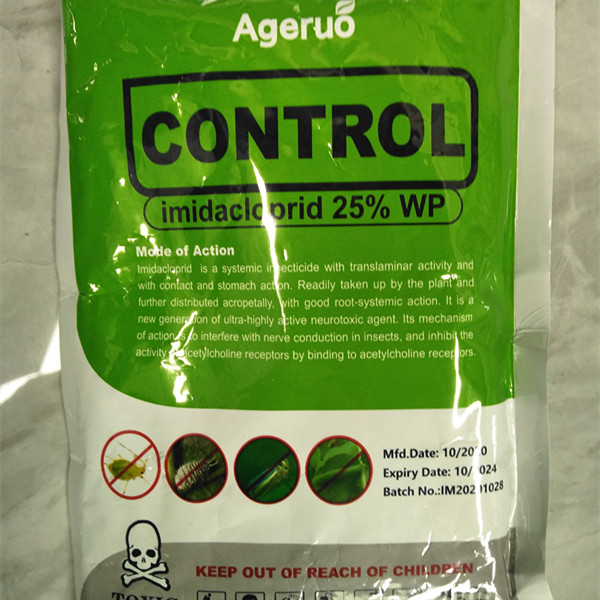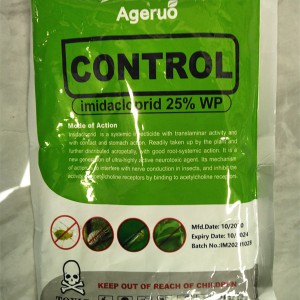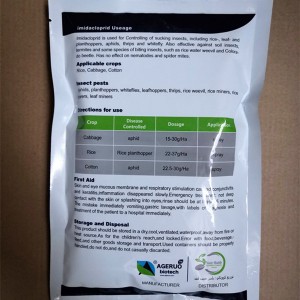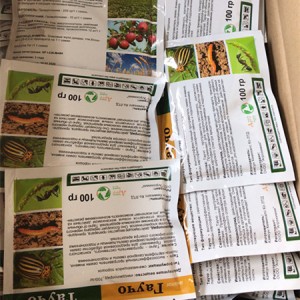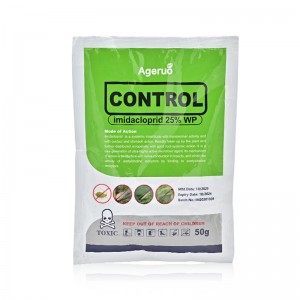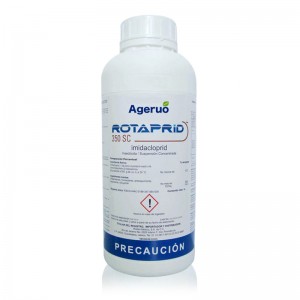Products
POMAIS Insecticide Imidaclorprid 25% WP 20% WP
Introduction
| Active ingredients |
Imidaclorprid 25% WP / 20% WP |
| CAS Number | 138261-41-3;105827-78-9 |
| Molecular Formula | C9H10ClN5O2 |
| Classification | Insecticide |
| Brand Name | POMAIS |
| Shelf life | 2 years |
| Purity | 25%; 20% |
| State | Powder |
| Label | POMAIS or Customized |
| Formulations | 200g/L SL; 350g/L SC; 10%WP, 25%WP, 70%WP; 70%WDG; 700g/l FS |
| The mixed formulation product | 1.Imidacloprid 0.1%+ Monosultap 0.9% GR
2.Imidacloprid25%+Bifenthrin 5% DF 3.Imidacloprid18%+Difenoconazole1% FS 4.Imidacloprid5%+Chlorpyrifos20% CS 5.Imidacloprid1%+Cypermethrin4% EC |
Benefits of Imidacloprid
Broad-spectrum insecticidal effect: Imidacloprid is effective against a wide range of piercing-sucking pests.
Low mammalian toxicity: high safety for humans and domestic animals.
Efficient and long-lasting: good knockdown effect and long residual control.
Mode of Action
Imidaclorprid is a kind of nicotine insecticide, which has many effects such as contact killing, stomach poisoning and internal inhalation, and has good effects on piercing mouthparts pests. The normal conduction of the central nervous system is blocked after the pest contacts with the drug, which makes it paralyzed and dead. It has a certain effect on sucking mouthparts and resistant strains such as wheat aphids.
Chemical composition of Imidacloprid
Imidacloprid is an organic compound containing a chlorinated nicotinic acid moiety with the molecular formula C9H10ClN5O2, which interferes with insect neurotransmission by mimicking the action of nicotinic acetylcholine (ACh).
Interference with insect central nervous system
By blocking nicotinic acetylcholine receptors, imidacloprid prevents acetylcholine from transmitting impulses between nerves, leading to paralysis and eventual death of the insect. It is capable of exerting its insecticidal effect through both contact and gastric routes.
Comparison with other insecticides
Compared to conventional organophosphorus insecticides, imidacloprid is more specific to insects and less toxic to mammals, making it a relatively safe and effective insecticide option.
Suitable crops:

Act on these Pests:

Imidacloprid application areas
Seed treatment
Imidacloprid is one of the world's most popular seed treatment insecticides, providing early plant protection by effectively protecting seeds and improving germination rates.
Agricultural applications
Imidacloprid is widely used to control a variety of agricultural pests such as aphids, sugarcane beetles, thrips, stink bugs and locusts. It is particularly effective against stinging pests.
Arboriculture
In arboriculture, imidacloprid is used to control emerald ash borer, hemlock woolly adelgid, and other tree-infesting pests, and to protect species such as hemlock, maple, oak, and birch.
Home protection
Imidacloprid is used in home protection to control termites, carpenter ants, cockroaches, and moisture-loving insects for a safe and sanitary home environment.
Livestock Management
In livestock management, imidacloprid is used to control fleas and is commonly applied to the back of the neck of livestock.
Turf and Gardening
In turf management and horticulture, imidacloprid is mainly used to control Japanese beetle larvae (grubs) and a variety of horticultural pests such as aphids and other stinging pests.
Using Method
| Formulation | Crop names | Fungal diseases | Dosage | Usage method |
| Imidacloprid 600g/LFS | Wheat | Aphid | 400-600g/100kg seeds | Seed coating |
| Peanut | Grub | 300-400ml/100kg seeds | Seed coating | |
| Corn | Golden Needle Worm | 400-600ml/100kg seeds | Seed coating | |
| Corn | Grub | 400-600ml/100kg seeds | Seed coating | |
| Imidacloprid 70%WDG | Cabbage | Aphid | 150-200g/ha | spray |
| Cotton | Aphid | 200-400g/ha | spray | |
| Wheat | Aphid | 200-400g/ha | spray | |
| Imidacloprid 2%GR | lawn | Grub | 100-200kg/ha | spread |
| Chives | Leek Maggot | 100-150kg/ha | spread | |
| Cucumber | Whitefly | 300-400kg/ha | spread | |
| Imidacloprid 25% WP | Wheat | Aphid | 60-120g/ha | Spray |
| Rice | Rice planthopper | 150-180/ha | Spray | |
| Rice | Aphid | 60-120g/ha | Spray |
Effects of Imidacloprid in the Environment
Effects on insect communities
Imidacloprid is not only effective against target pests, but may also affect bees and other beneficial insects, leading to a decrease in their populations and disrupting the ecological balance.
Effects on aquatic ecosystems
Loss of imidacloprid from agricultural applications may contaminate water bodies, causing toxicity to fish and other aquatic organisms and affecting the health of aquatic ecosystems.
Impacts on mammals and humans
Despite the low toxicity of imidacloprid to mammals, long-term exposure may pose a health risk and requires careful use and management.
Usage and precautions for imidacloprid
Correct use
Imidacloprid should be used as a foliar spray when insect populations reach the Economic Loss Level (ETL) to ensure full crop coverage.
Precautions in use
Use a good quality sprayer and hollow cone nozzle.
Adjust dosage according to crop growth stage and area covered.
Avoid spraying in windy conditions to prevent drifting.
FAQ
What is Imidacloprid?
Imidacloprid is a neonicotinoid systemic insecticide mainly used to control stinging pests.
What is the mechanism of action of imidacloprid?
Imidacloprid works by blocking nicotinic acetylcholine receptors in the insect's nervous system, leading to paralysis and death.
What are the application areas of Imidacloprid?
Imidacloprid is widely used in seed treatment, agriculture, arboriculture, home protection, livestock management, as well as in turf and horticulture.
What is the environmental impact of imidacloprid?
Imidacloprid may negatively affect non-target insects and aquatic ecosystems and needs to be used with caution.
How do I use imidacloprid correctly?
Apply imidacloprid as a foliar spray when insect populations reach economic loss levels to ensure full crop coverage.
How to get a quote?
Please click 'Leave Your Message' to inform you of the product, content, packaging requirements and quantity you are interested in, and our staff will quote you as soon as possible.
What packaging options are available for me?
We can provide some bottle types for you to choose, the color of the bottle and the color of the cap can be customized.
Why Choose US
Strict quality control procedure in each period of order and the third-party quality inspection.
Have cooperated with importers and distributors from 56 countries all over the world for ten years and maintain a good and long-term cooperative relationship.
Professional sales team serve you around the whole order and provide rationalization suggestions for your cooperation with us.

